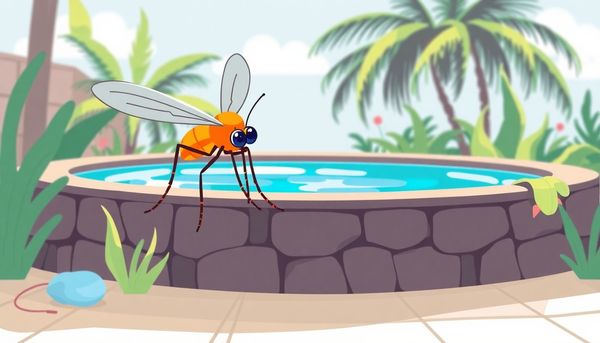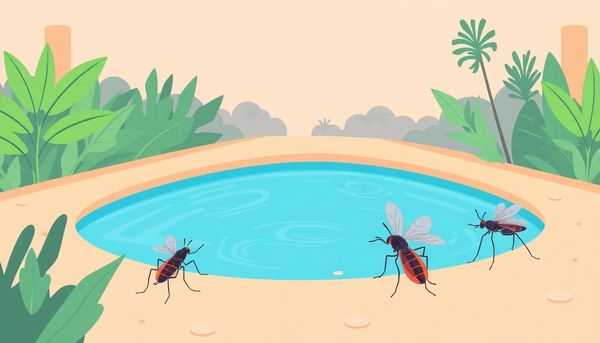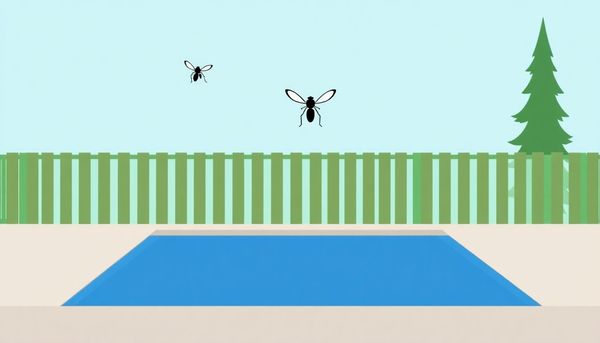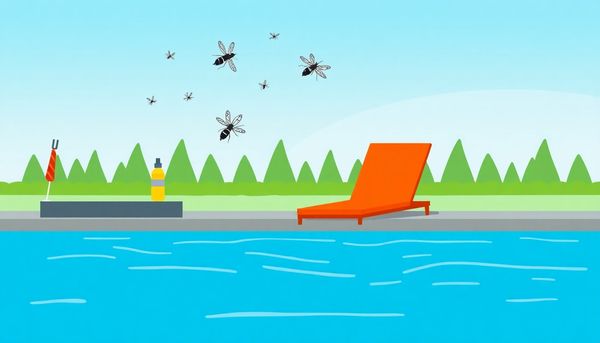Keep Mosquitoes Away: Essential Tips for a Pest-Free Poolside
June 28th, 2024
June 28th, 2024
Summer afternoons often paint a perfect scene—sunlight glistens on the surface of a pool, laughter echoes as friends and family gather. Yet, amidst this idyllic setting lurks a pesky nuisance: mosquitoes. These uninvited guests can swiftly turn a blissful gathering into an itchy nightmare. Years ago, I spent a holiday weekend at a friend’s house, only to find myself swatting away persistent mosquitoes more than enjoying a refreshing swim. This experience got me thinking about how essential it is to safeguard these serene moments by keeping mosquitoes at bay.
Understanding the habits and preferences of mosquitoes can be your first line of defense. They thrive in warm, humid environments and are particularly drawn to standing water—making swimming pools a prime target. While it may seem like a daunting task to keep them away, there are numerous strategies available to create a protective barrier around your pool. From natural repellents to technological solutions, the options are both varied and effective.
Dedicated pool owners know that maintaining a pest-free zone takes commitment, but the reward is a summer of uninterrupted enjoyment. Whether it's hosting a barbecue or simply floating in solitude, a mosquito-free poolside promises tranquility. In the following sections, we’ll explore creative and practical methods to ensure these buzzing intruders remain a distant memory.

Battling mosquitoes around your pool doesn't have to be an uphill task. Integrated pest management, a strategy championed by the EPA and CDC, is key in mitigating the mosquito menace. Start by tackling the places these pests love to breed. Inspect your yard post-rain and eliminate standing water from seemingly innocent culprits like flower pots and bird baths. For water features that can't be drained, such as fountains, keeping the water moving is crucial. Mosquitoes are discouraged by movement, which can thwart their breeding plans.
Next, consider the barriers. A pool cover, specifically a solar one, serves multiple purposes. It not only keeps mosquitoes at bay but helps in heating the pool and reducing water evaporation, making it a smart investment. Additionally, maintaining clean pool water with regular filtration ensures mosquitoes find no solace in your swimming haven.
For an eco-friendlier approach, encourage the presence of natural mosquito predators. Dragonflies, for example, thrive around ponds and are natural mosquito hunters. Installing a small water feature with tall plants can attract these beneficial insects. If local regulations permit, introducing mosquito fish to water features can also be effective.
Finally, when chemical methods become necessary, opt for EPA-registered larvicides and adulticides. These solutions can be applied to areas where mosquitoes are likely to congregate. However, exercise caution and ensure that these treatments do not harm beneficial insects or pollinators. In this battle against mosquitoes, a balanced strategy that combines environmental adjustments and targeted interventions can make all the difference.
There's a secret to keeping your pool area less appealing to mosquitoes—eliminate their breeding grounds. After a rain, take a stroll around your yard. You might be surprised at the number of places where water collects. Mosquitoes see these spots as prime real estate for laying eggs. Simply turning over items like buckets, wheelbarrows, and any other containers that could hold water can make a big difference. Not only does this help cut down on mosquito populations, but it also keeps your yard tidier.
Consider the less obvious culprits. Your home's gutters, clogged with leaves, become miniature wetlands if not cleaned regularly. Regular maintenance ensures water flows freely, denying mosquitoes a breeding ground. For stationary water features like fountains or birdbaths, make a habit of changing the water every week. A small task, yet highly effective in mosquito control.
For areas where water must remain, such as ponds, introducing mosquito fish might be a solution. These tiny allies feast on mosquito larvae, effectively reducing their numbers. If natural solutions are more your style, dragonflies are another option. These elegant predators can help keep the mosquito population in check, too.
By addressing these breeding spots, you not only reclaim your pool area from these pests but also enhance the health and comfort of your outdoor space. With a bit of keen observation and regular care, your poolside can become a serene haven, free from the hum of unwelcome guests.
The gentle whir of dragonfly wings can be a delightful addition to any poolside. Not only do they add a touch of natural elegance, but these creatures are also voracious mosquito hunters. They thrive around ponds and water features, snacking on pesky mosquitoes and their larvae. Consider setting up a small pond with native plants like cattails to attract them. A pond, even a modest one, provides a perfect breeding ground for dragonflies, without welcoming mosquitoes, especially if you use mosquito dunks to keep larvae at bay.
For those with a penchant for piscatorial solutions, introducing mosquito fish into your garden pond can be an effective strategy. These little swimmers have an insatiable appetite for mosquito larvae. Some local vector control agencies may even offer them for free, recognizing that reducing mosquito populations benefits the whole community. However, it’s crucial to check local regulations first, as these fish can disrupt delicate ecosystems if introduced inappropriately.
Overhead, bats silently glide through the night, consuming hundreds of insects as they fly. While it’s not advisable to go out of your way to attract these creatures due to the potential health risks they carry, allowing existing local bat populations to remain undisturbed can help naturally curb mosquito numbers. These nocturnal mammals prefer to keep their distance from humans, making them ideal allies in the fight against mosquitoes. Embrace their presence, and you might just find your nights a bit more peaceful.
There's a certain satisfaction in outsmarting those pesky mosquitoes, especially when it comes to protecting your oasis by the pool. One strategic move involves effective repellents, which can act as your first line of defense against these unwanted guests. Personal experiences reveal that while some commercial options may fail, combining them strategically can transform your backyard into an unfriendly zone for mosquitoes.
First, consider utilizing natural plant-based repellents. Citronella, while enjoying a mixed reputation, can be surprisingly effective when used in concentrated oils or sprays. Planting lemon balm, basil, or marigolds around your pool can enhance this effect, adding an aromatic barrier that mosquitoes find unpleasant. A friend of mine swears by her homemade spray using a blend of lemon eucalyptus oil and water, claiming it keeps the bugs at bay during her evening swims.
For more stubborn mosquito populations, DEET-based repellents remain a strong contender. Products with DEET, picaridin, or oil of lemon eucalyptus are endorsed by the EPA and have been shown to significantly reduce bites. Just remember to apply these carefully, avoiding direct contact with your pool water to keep it chemical-free.
Finally, electronic mosquito traps can complement your efforts. While no trap is foolproof, high-quality models that use carbon dioxide to lure mosquitoes can reduce their numbers over time. My neighbor, an enthusiast for tech solutions, installed a trap that led to noticeably fewer mosquitoes buzzing around his late-night gatherings.
By combining plant-based solutions, reliable chemical repellents, and innovative traps, you can enjoy your swim without the constant swatting. So, gather your tools, get creative with your plant choices, and make your poolside a sanctuary free from mosquito disruptions.

In the battle against mosquitoes, nature offers an effortless ally: their predators. Encouraging these creatures to visit and stay in your yard can help reduce mosquito populations around your pool. Dragonflies, for instance, are not just visually captivating with their iridescent wings, but they are also voracious mosquito eaters. A small pond with water plants like cattails can entice these aerial acrobats, allowing them to lay eggs and create a habitat. Even a modest water feature can become a dragonfly haven, turning your yard into a picturesque and mosquito-free zone.
Meanwhile, mosquito fish are another excellent option. These tiny warriors feast on mosquito larvae and can thrive in your pond or water garden. Some local agencies even offer them for free due to their effectiveness in mosquito control. However, it’s crucial to ensure mosquito fish are permitted in your area, as they can be invasive if introduced to unsuitable environments.
While bats might not be everyone's first choice of backyard companions, they can be incredibly useful if they already inhabit the area. These nighttime hunters can munch through hundreds of insects in an evening. If you find bats are natural residents nearby, allow them to stay undisturbed. They’ll likely avoid human contact, quietly contributing to pest control from the shadows.
By welcoming these natural mosquito hunters, you not only enhance your garden's ecosystem but also enjoy a more serene, bug-free time by the poolside.
Your backyard can transform into a buzzing paradise, not just for mosquitoes but for their elegant predators—dragonflies. These fascinating creatures are not only a sight to behold but also nature’s own pest control squad. My aunt's garden, for instance, became a summer haven for dragonflies after she installed a small pond amidst her flower beds. A simple water feature, no need for an elaborate structure, can draw them to your yard.
Consider creating a dragonfly-friendly environment by incorporating tall plants like cattails or reeds around your water feature. These plants provide vital perching spots and egg-laying sites for dragonflies. When eggs are laid, they typically prefer water plants, using them as a nursery until their vibrant offspring are ready to take flight. This means a small pond or even a birdbath with some aquatic vegetation can serve as an attractive home.
Furthermore, keep the water clean but avoid using harmful chemicals that could deter dragonflies from settling in. Instead, opt for mosquito dunks, a larvicide that targets mosquito larvae without affecting dragonflies or other beneficial insects. This creates a balance, allowing dragonflies to thrive while keeping mosquito numbers in check. Thriving dragonfly populations not only enhance your garden’s ecosystem but also contribute significantly to reducing the mosquito menace around your pool area. Embrace these winged wonders and watch as they gracefully patrol your yard, ensuring a peaceful, bite-free summer for you and your family.
In the quest to keep your pool area mosquito-free, consider enlisting some unexpected allies: mosquito fish. These small, unassuming creatures are voracious consumers of mosquito larvae and can play a significant role in controlling mosquito populations. However, introducing them into your pool ecosystem requires careful consideration and responsibility.
A few summers ago, my neighbor decided to introduce mosquito fish to his backyard pond. At first, we were skeptical—would these tiny fish really make a difference? Yet, within weeks, we noticed a marked reduction in the mosquito population. A key factor in this success was my neighbor’s diligence in ensuring the fish remained in a contained water feature, preventing them from disrupting local ecosystems.
Before releasing mosquito fish into your environment, it’s crucial to check your local regulations. In some areas, these fish are considered invasive species, as their appetite for larvae isn't limited to mosquitoes alone. They can outcompete native fish and disrupt the local aquatic ecosystem if introduced into natural water bodies.
If deemed appropriate in your region, consider adding mosquito fish to a controlled pond or water feature, not your actual pool. This approach allows them to thrive and do their job without unintended ecological consequences. Remember, responsible introduction of mosquito fish can contribute to a healthier, more enjoyable poolside experience while respecting the local environment.
Bats, those enigmatic creatures of the night, often get a bad rap, but they might just be your unexpected allies in the battle against mosquitoes. While the thought of hosting a bat colony might make some shudder, bats naturally residing in your area can be a boon. Known for their voracious appetites, many bat species feast on a variety of insects, including mosquitoes, moths, and beetles. By simply allowing these nocturnal diners to continue their rounds, you can reduce the mosquito population around your pool without lifting a finger.
Start by ensuring the conditions are favorable for bats to thrive in their existing habitats. They favor quiet, undisturbed spaces, so maintaining a calm and natural environment in parts of your property can be beneficial. If there are already bats nearby, keep artificial lights to a minimum during the evening. Bright lights can disrupt their hunting activities, potentially leading them to seek more hospitable feeding grounds.
If you have trees or structures that bats might use for roosting, consider letting them be. These natural shelters are perfect for bats to rest during the day. Avoid unnecessary disturbances or loud noises, especially at dusk and dawn when bats are most active. By respecting their space, you allow these creatures to perform their nightly insect control, keeping your poolside environment more enjoyable. As the bats work through the night, you might find your pool area a little less buzzing with unwelcome guests come morning.

Mosquitoes are unwelcome guests that no one wants at their pool party. Beyond the itch, they carry risks that can seriously impact health. To ensure your pool area remains a sanctuary rather than a mosquito haven, consider transforming it into a fortress of protection.
Start by evaluating the perimeter of your pool. High-quality screens are indispensable; they act like a force field, keeping these pesky critters at bay. If your pool isn't already enclosed, screens or mesh barriers can be lifesavers. Regular checks for any tiny tears or gaps are essential since even the smallest breach can invite trouble.
Think about adding some green defenders. Plants like citronella, marigolds, and lavender can lend a hand. Their natural oils are believed to repel mosquitoes, and they add beauty and fragrance to your space. While their effectiveness might not eliminate mosquitoes entirely, they contribute to a less welcoming environment for the bugs.
For an innovative approach, consider installing outdoor ceiling fans. Mosquitoes are weak flyers, and a good breeze can make it difficult for them to land. Plus, moving air helps disperse the carbon dioxide we exhale, making it harder for mosquitoes to track you down.
Lastly, stay vigilant about water maintenance. Regularly clean your pool and ensure any surrounding areas are free of stagnant water. A clean pool is not just inviting for a swim, but less inviting for mosquitoes. Embrace these strategies, and your poolside gatherings will be more about fun and less about fighting off uninvited guests.
Harnessing the power of Integrated Pest Management (IPM) can transform your poolside into a fortress against mosquitoes. While swatting at these pesky invaders might offer temporary relief, a more strategic, methodical approach promises long-term peace. IPM combines prevention, monitoring, and control strategies to minimize mosquito populations efficiently and safely.
The first step in implementing IPM is habitat disruption. Mosquitoes thrive in standing water, so regularly inspect your property for potential breeding sites. Rain gutters, plant pot saucers, and pool covers are common culprits. After a downpour, a quick walk around your yard to empty any stagnant water can prevent countless larvae from hatching.
Next, adopt biological controls. Consider introducing natural predators, like mosquito fish or dragonflies, which feast on mosquito larvae. These allies can be a charming and environmentally friendly addition to your garden pond or water features. If you’re worried about compatibility with local ecosystems, check with local extension services for advice on suitable species.
Chemical controls, while effective, should be used judiciously. Larvicides can target mosquitoes before they mature, but always follow safety guidelines to protect non-target species. For immediate results against adult mosquitoes, outdoor sprays can offer respite before your next pool party, though they should be applied with caution.
Lastly, structural barriers offer a practical layer of defense. Installing screen enclosures around your pool area not only keeps mosquitoes at bay but also shelters you from other unwelcome critters. By weaving together these strategies, IPM helps you reclaim your poolside bliss, ensuring it remains a haven for relaxation, not a mosquito smorgasbord.
Discovering a hidden mosquito breeding ground in your backyard can feel like finding a secret, unwelcome party in full swing. Mosquitoes don’t just love water—they thrive in it. With a pool in your backyard, it’s crucial to be vigilant about eliminating additional sources of standing water that these pests find irresistible. Rain showers or overzealous sprinklers often leave pools of water lingering unnoticed in forgotten corners of your property.
First, take a walk around your yard and identify sneaky spots where water collects. Old flower pots, discarded tires, and underused garden tools are typical culprits. Even a small bottle cap full of water can become a mosquito nursery. Flip over any items that might catch rain, and store them in a dry place. If you have bird baths or kiddie pools, make it a weekly ritual to empty and refresh the water.
Certain areas, like clogged gutters or low-lying lawn patches, may require more effort. Ensuring proper drainage not only helps keep mosquitoes at bay but also promotes a healthier garden overall. For water features or ponds that you can't drain, consider introducing mosquito dunks—natural larvicides that target mosquito larvae without harming other wildlife.
In doing so, you’re not just protecting your family’s comfort and health, but also creating a more serene outdoor space, free from the relentless buzzing of these tiny invaders. A few proactive steps can turn your backyard from a mosquito haven into a blissful escape.
Mosquitoes thrive near water, and your pool is no exception. Yet, there's a stylish and effective solution to keep these pesky creatures at bay: pool enclosures. These structures act as a protective shield around your swimming oasis, creating an intimate space untouched by mosquitoes and other nuisances. A few years back, my aunt installed a mesh enclosure around her pool in Florida, a state notorious for its mosquito population. Not only did it transform her backyard into a serene retreat, but it also drastically reduced the number of bites and disturbances during family gatherings.
Pool enclosures come in various materials, including mesh, glass, or fiberglass. While the mesh option is popular for its airflow and cost-effectiveness, glass and fiberglass provide robust barriers against the elements and pests alike. Each type brings unique benefits, such as UV protection or wind resistance, enhancing your outdoor experience. However, maintenance is key. Just as a small tear in a screen door can invite unwanted guests, a minor gap in your enclosure can nullify its purpose. Regular inspections and prompt repairs ensure your enclosure remains an impenetrable fortress against mosquitoes.
For those who appreciate aesthetics alongside function, incorporating long drapes or netting around the enclosure can add a touch of elegance while reinforcing your defense against insects. Whether tied back during the day or drawn at dusk, these additions combine practicality with style, making your pool area both beautiful and bug-free.
In the battle against mosquitoes around your pool, nature can be your greatest ally. Think of your yard not just as a space, but as an ecosystem where balance can be restored with a little help from Mother Nature. By inviting natural predators into your environment, you create a sustainable and effective method for keeping these pesky intruders at bay.
First, consider the dragonfly, a tiny aerial acrobat with an insatiable appetite for mosquitoes. Dragonflies are capable of devouring hundreds of mosquitoes each day. To attract them, consider adding a small pond or water feature surrounded by native plants to your outdoor space. It's an open invitation for dragonflies to lay their eggs and set up camp around your pool.
Next, meet the mosquito fish. These small fish are specialist hunters of mosquito larvae, making them a perfect addition to ponds or water features. Many local vector control programs offer them for free because they significantly curb mosquito populations without introducing harmful chemicals into the ecosystem. Just ensure they’re legal in your area, as their introduction needs to be properly managed.
Finally, while bats might evoke images of spooky caves, they are actually voracious consumers of flying insects, including mosquitoes. If bats naturally inhabit the area, allow them to do their work without interference. Setting up bat houses, for example, can encourage their presence without inviting them too close for comfort.
By fostering these natural relationships, your pool area can become a haven not just for relaxation, but also for a thriving community of beneficial creatures working together to keep pesky mosquitoes in check.
No one enjoys a poolside afternoon ruined by relentless mosquito bites. To keep these pesky insects at bay, using effective repellents is a key strategy. Consider DEET-based products, known for their long-lasting protection and endorsed by experts. A neighbor once shared how a DEET spray allowed her family to finally enjoy evenings on their deck without the itchy aftermath. It's potent, safe if applied correctly, and can be your best ally against mosquitoes.
For those seeking a more natural approach, oil of lemon eucalyptus offers a refreshing scent with a decent mosquito-repelling reputation. Picaridin also ranks highly, often found in lotions that require fewer applications than sprays. These alternatives provide a gentler option for those sensitive to conventional repellents.
Ever tried setting up mosquito coils or citronella candles around your pool area? While these provide a mild deterrent, they’re best used to complement stronger repellents. A friend once swore by creating a perimeter of citronella around her patio; it didn't eliminate mosquitoes entirely but certainly reduced their numbers, allowing for more comfortable outdoor gatherings.
For optimal protection, apply your chosen repellent liberally on exposed skin and clothing. Pay special attention to areas like ankles and wrists, which mosquitoes adore. By integrating these repellent strategies into your routine, you can transform your poolside experience into a sanctuary free from unwanted buzzing guests.

In the battle against mosquitoes, choosing the right repellent can be your secret weapon. Think of repellents as a shield, keeping those pesky insects at bay while you enjoy a peaceful time by the pool. Not all repellents are created equal, and knowing which ones to trust can make a world of difference. A classic champion in the world of repellents is DEET. This potent formula has stood the test of time and consistently ranks as one of the most effective options available. Products containing DEET can provide long-lasting protection, making them a staple in many households.
For those seeking alternatives, picaridin offers another reliable option. It's less greasy than DEET and can be just as effective, especially in keeping mosquitoes away during evening swims. Oil of lemon eucalyptus is another favorite for those who prefer a more natural approach. Despite its pleasant scent, it acts as a powerful deterrent.
Incorporating repellents into your mosquito-fighting arsenal doesn’t mean you have to compromise on personal comfort. Many of these products are available in lotions, sprays, and wipes, allowing you to choose what suits your lifestyle best. Think back to those summer evenings when citronella candles were the go-to—though nostalgic, modern repellents offer a more scientifically-backed solution. So, as you plan to reclaim your poolside paradise, arm yourself with the right repellent and enjoy those sunny days without a worry in the world.
On a warm summer evening, the allure of a shimmering pool can be dampened by the relentless buzz of mosquitoes. Rather than relying solely on temporary solutions, embracing an Integrated Pest Management (IPM) strategy can provide lasting relief. This approach, recommended by experts like the EPA and CDC, combines multiple tactics to combat mosquitoes effectively in all of their life stages.
Start by examining your surroundings with a fresh perspective. Mosquitoes thrive in stagnant water, so it’s crucial to eliminate any potential breeding grounds. Check for hidden culprits like clogged gutters, flower pot saucers, and the forgotten kiddie pool. Even a small amount of standing water can become a breeding hotspot. For areas where water is unavoidable, such as bird baths or ornamental ponds, consider introducing mosquito-repelling agents like larvicides or even mosquito fish, nature's voracious larvae eaters.
Beyond water management, structural barriers provide another layer of defense. Installing screens on windows, doors, and around pool enclosures can drastically reduce mosquito access. Regularly inspect these barriers for tears or gaps, as even the smallest opening can welcome a swarm of unwanted guests.
Lastly, think about your yard’s ecosystem. Encourage natural mosquito predators like dragonflies by adding plants that attract them. While bats are less common, they do contribute significantly to controlling insect populations if they happen to reside nearby. With these steps, you not only protect your pool from becoming a mosquito haven but also create a more harmonious outdoor environment where you can truly relax and enjoy your time under the sun.
Taming the mosquito menace around your pool begins with eliminating their cozy breeding spots. After a summer rain, stroll through your yard, and you might be surprised where water tends to linger. From overturned flower pots to forgotten toys in the grass, even the smallest puddle can become a mosquito nursery. Mosquito eggs can patiently wait for months in dry conditions, just biding their time for a splash of rain to hatch them into life. So, it's crucial to ensure no standing water remains unnoticed.
Consider those often-overlooked spots like clogged gutters or drainage areas. Regularly clean gutters to prevent water buildup, and ensure your drainage systems are functioning well to keep water flowing. If you have any decorative water features, install a pump or fountain to keep the water circulating. Mosquitoes prefer stagnant water, so motion is a mosquito deterrent.
For areas you can’t drain, such as bird baths or plant saucers, change the water at least once a week. This interrupts the mosquito lifecycle, preventing them from progressing to adulthood. If you use rain barrels, make sure they are tightly sealed or fitted with fine mesh screens to keep mosquitoes out. By taking these steps, you're not just tidying up your yard; you're striking a blow against mosquitoes and protecting your poolside sanctuary.
Ever wondered what makes mosquitoes steer clear of some places? Turns out, using the right repellents can help transform your poolside from a mosquito magnet into a serene haven. The EPA has conducted extensive research to identify effective mosquito repellents, and their recommendations are designed not only for effectiveness but also safety. If you’ve ever spent an evening swatting at mosquitoes, you know how important this is.
A personal favorite is a good DEET-based repellent. DEET has been a staple for years and is renowned for its long-lasting protection. Once, during a camping trip, I learned the hard way just how effective it was—covering one arm with DEET and the other without, the difference was stark. DEET-clad skin remained untouched, while the untreated arm became a buffet.
Picaridin is another excellent choice, often praised for its pleasant scent and non-oily feel. It mirrors DEET’s protective qualities without the strong odor. For a more natural alternative, oil of lemon eucalyptus is highly recommended. It's derived from the lemon eucalyptus plant and offers a fresh scent along with mosquito deterrence.
When choosing a repellent, consider the environment and potential skin sensitivities. The EPA offers a tool to help find the perfect match for your needs, ensuring you can enjoy your poolside without uninvited guests buzzing around. With these repellents, your backyard can become a peaceful retreat, free from pesky interruptions.

This article provided insights into maintaining your pool. Start your pool care journey today!
Want to become a pool maintenance expert? Our free Pool School course covers everything you need to know about pool care. From basic maintenance to advanced troubleshooting, you'll learn how to:
Join over 10,000 pool owners who have already transformed their pool care routine. Get started with our free Pool School course today!